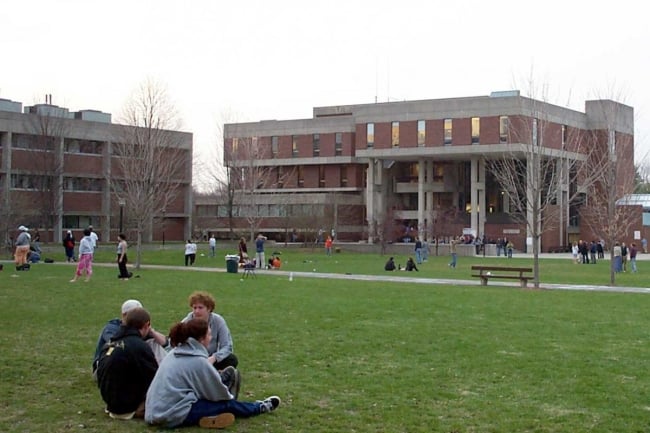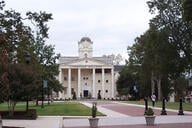You have /5 articles left.
Sign up for a free account or log in.

Students gather near the Harold F. Johnson Library at Hampshire College
Jared Benedict
Hampshire College, founded as a 1970s-era experiment in self-directed education, is looking for a partner to help keep it afloat. As part of its process, it is mulling whether to enroll a freshman class this fall.
In a letter posted online Tuesday, college president Miriam E. Nelson said she plans to find a “long-term partner that can help us achieve a thriving and sustainable future for Hampshire.”
The college, which celebrates its 50th anniversary in 2020, is supported by a modest $52 million endowment that “has performed well,” Nelson said. But the college has been an “under-endowed institution, really from our very first days.” And while Hampshire can still boast a balanced budget, she said the college, like others of its size, faces “bruising financial and demographic realities” that challenge its continued existence.
Seeking a strategic partnership “is the right and responsible thing to do,” Nelson said. “And now is the time to do it.”
She said the college hopes to have a partner in place by the end of the semester.
In an accompanying FAQ, Nelson said flatly, “Hampshire will not close.”
But she surprised alumni by announcing that the college is “carefully considering whether to enroll an incoming class this fall.” Nelson's FAQ noted, “As we look out to the years ahead, we can’t be certain that we could guarantee an incoming class the same educational experience we offer today through all four years.” It will make the decision on a new class before the Feb. 1 admissions notification date.
Well-known librarian and author Jessamyn West, a 1990 Hampshire graduate, said she was “surprised at the abruptness of that part,” given that Hampshire is generally good about communicating with alumni.
“There are a lot of alumni groups on Facebook,” she said. “And they’re all losing their minds today.”
Students design their own programs of study at Hampshire instead of following predetermined academic pathways (no "off-the-shelf" majors).
Well-known in the universe of small liberal arts colleges, Hampshire offers an interdisciplinary, inquiry-based education driven by projects and discussions. It relies on "narrative evaluations" instead of letter grades.
The product of a concerted effort by four western Massachusetts institutions -- Amherst, Mount Holyoke and Smith Colleges, along with the University of Massachusetts at Amherst -- to do something new, Hampshire expanded what was then a “Four Colleges” consortium into Five Colleges Inc., all of which allow students to take course work at neighboring institutions.
Smith president Kathleen McCartney on Tuesday said in a statement that Smith had been notified of Hampshire’s intent last week and was “working to understand the implications” of the announcement. “Our priority is to provide the best guidance and support to our community, especially those whose areas of work or study intersect with Hampshire College.”
McCartney said Hampshire “has been an important force for academic innovation” since its inception. “I hope that a new partnership can sustain that legacy.”
Hampshire is young by New England college standards -- it admitted its first class in 1970 -- though the idea had been kicking around for more than a decade before that. In 1958, the presidents of the three area colleges, along with UMass Amherst, created a committee to look into creating a fifth institution “with which they might develop new departures in educational methods and techniques.”
The group, which dubbed the experimental institution New College, concluded that the most important contribution a college can offer students -- and one that would sound familiar these days -- is “to develop in them a capacity to continue their education throughout their lives.”
The committee concluded that college students “are capable of far more independence than they exercise in present college programs.” So they proposed that a new type of institution that “frees both students and faculty from the system which makes education a matter of giving and taking courses to cover subjects.”
The college would cover subjects by training students to master fields themselves, taking only three courses at a time. It would rely on students’ curiosity coupled with a close relationship with instructors.
A $6 million donation from Amherst College alumnus Harold F. Johnson and a matching grant from the Ford Foundation allowed trustees to buy 800 acres of orchard and farmland in South Amherst, Mass.
Nearly 50 years later, Hampshire calls its educational model an inquiry-based, interdisciplinary “graduate school model of undergraduate education,” in which small, intimate seminars are the rule, not the exception. Hampshire says it retains a student-faculty ratio of 11 to one.
It enrolls about 1,400 students. Even as it remains fairly unique in American higher education, it is not selective -- federal data show that Hampshire admitted 65 percent of applicants in 2017.
Ralph J. Hexter, provost at the University of California, Davis, who was Hampshire’s president from 2005 to 2010, said in an email that he learned about the partnership announcement from Hampshire’s board chair early Tuesday -- shortly before Nelson’s letter was circulated.
While he had no firsthand knowledge of the college’s current financial straits, Hexter noted that “smaller liberal arts colleges, particularly those outside large urban areas, are facing strong headwinds.”
But he said Hampshire “holds a special place” among its peers. “Its virtually unique pedagogy affords students extraordinary educational opportunities yet has always attracted only a subset of those who are looking at liberal arts colleges, a group whose number continues to shrink given their and their parents’ career-oriented thinking.”
Hexter said Nelson and the Hampshire board “are wise to get out in front of the situation and work proactively to strengthen the college’s financial prospects. I also think they deserve kudos for their courageous transparency.”
John R. Thelin, a University of Kentucky professor and historian of higher education, called Hampshire “a place that has really stood for a distinctive approach to liberal education.”
Its location, amid four other well-known institutions, is both a blessing and a curse. “It’s in such a fertile territory for colleges -- on the one hand, that can be a benefit … but on the other hand, it means that they are in a very competitive market.”
Even in New England, he said, colleges are now competing for a shrinking college-age population.
Hampshire's distinctive countercultural values and its relatively small alumni group also work against it, Thelin said. “It’s not going to have the base of old, wealthy alumni” that its older peers enjoy.
Times have been tough for nonwealthy private colleges in Massachusetts. Last April, Mount Ida College announced that it would close, Wheelock College last year merged into Boston University and Atlantic Union College in February said it would close after losing accreditation in 2011. Newbury College announced in December that it would close at the end of this academic year.
Thelin, author of the new book Going to College in the ’60s, said a well-conceived partnership could work -- he suggested that Hampshire could become a kind of honors college for one of the nearby institutions.
West, the alumna, said she wouldn’t necessarily oppose the honors college route, which could make Hampshire “an institute for braniacs” at a more established place like Amherst College. But Hampshire has long promoted values that put it at odds with late-stage capitalism, she noted, so if it pursues a partnership with a for-profit college, she and her fellow alumni would strongly object. “If you do that, you’re dead to me,” she said, “and I’ll fight against you with my last dying breath -- because that’s not, to me, what education is for.”
West gave Hampshire credit for being “prescient” about the state of higher education, but said the casual mention of closing off enrollment next fall concerns her. “I’m really hoping this is just a shot across the bow to try and get a couple of wealthy alumni to pony up several million dollars so they can be a little more resilient,” she said.
Hampshire’s notable alumni include filmmakers Ken Burns, Barry Sonnenfeld and Lee Hirsch; journalist Edward Humes; actors Lupita Nyong'o and Liev Schreiber; cognitive scientist Gary Marcus and comedian Eugene Mirman.
“I’m not sure you can get that much more out of Hampshire alums, unless it turns out that Elon Musk went there for a week and he can give the school a billion dollars,” West said. “Most of us are tree-hugging, follow-your-dreams kind of people, which means a lot of us, as much as we might want to help support the school, aren’t necessarily rolling in it and may not have much more to give than we’ve been giving.”
Though Hampshire will almost certainly celebrate its 50th anniversary next year, West said it’s not clear that the “New School” was meant to be a permanent fixture.
“Maybe it was just supposed to ride the arc of the ’70s, ’80s and ’90s and go away,” she said. “Maybe higher education is different now -- maybe everybody should just learn to code, which I don’t personally believe. But I know that’s the feeling in the air.”




